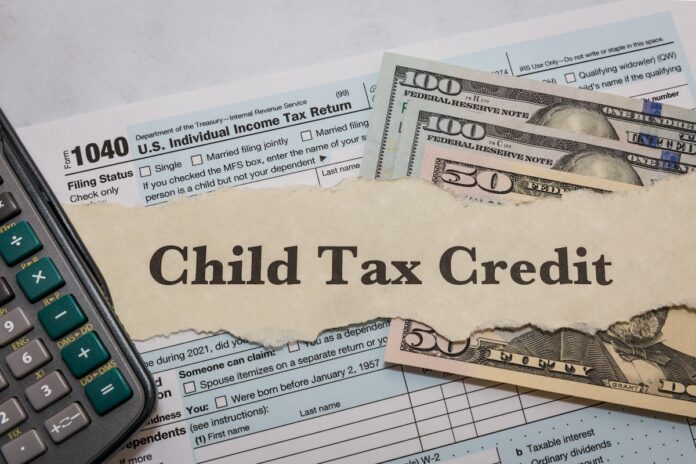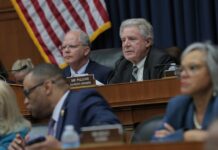
WASHINGTON (States Newsroom) — Senate Republicans and two independents blocked a bipartisan tax package Thursday that would have temporarily expanded the child tax credit and revived tax breaks for some business activities.
The 48-44 procedural vote to advance the package was largely viewed as a messaging exercise by Senate Majority Leader Chuck Schumer ahead of the August recess and continued ramp up to the general election in November, when the presidency and control of Congress are on the line.
The vote on the tax bill was the Senate’s last until it returns in September. The House left for August recess a full week ahead of the Senate.
During a post-vote press conference, Schumer said, “American families lost.”
“Today, Senate Republicans boldly told the American people we refuse to help you in 2024, and we want to be frank, Republicans voted no because of partisanship, not policy,” the New York Democrat said.
Not all Senate Republicans voted against the bill. Those who voted yes included: Sens. Markwayne Mullin of Oklahoma, Josh Hawley of Missouri and Rick Scott of Florida.
Sens. Bernie Sanders of Vermont and Joe Manchin III of West Virginia, independents who generally caucus with the Democrats, voted no.
Schumer switched his vote from yes to no as a way to enter a motion to reconsider, a routine maneuver.
Eight senators did not vote Thursday, including Democrat John Fetterman of Pennsylvania, and Republicans Marsha Blackburn of Tennessee, John Hoeven of North Dakota, Mitt Romney of Utah, Tim Scott of South Carolina, Mark Warner of Virginia, and Republican vice presidential candidate and Ohio Sen. J.D. Vance. Convicted felon and soon-to-be former Democrat Sen. Robert Menendez of New Jersey also did not vote.
‘Show vote,’ Republicans say
A large swath of Senate Republicans, including their top tax writer, Mike Crapo of Idaho, the ranking member of the Senate Committee on Finance, has remained opposed to the legislation, which needed 60 votes to advance in the closely divided upper chamber.
Crapo panned the cloture vote on the floor ahead of time as a “doomed-to-fail show vote” that is “focused on election year messaging.”
“If the Democrats are serious about helping these working families, I’m ready to push for an extension of those changes beyond 2025. I’ve maintained a willingness to negotiate a bill that provides meaningful relief to Americans now,” Crapo said.
Taxation has risen on the list of campaign issues as the Trump-era tax law is set to expire at the end of 2025, teeing up a major debate for the next administration and Congress.
“I offered to make changes,” Sen. Ron Wyden, an Oregon Democrat and chair of the Senate Finance Committee, said on the floor ahead of the vote. “I met with a significant number of Senate Republicans personally.”
“This is a thoroughly bipartisan bill — 357 votes in the House of Representatives. Every Republican on the House Ways and Means Committee voted for this bill.”
Child tax credit and the campaigns
In a recent interview with news personality Megyn Kelly, Vance accused the likely Democratic presidential nominee, Vice President Kamala Harris, of being opposed to the child tax credit, a statement that has been debunked.
Democrats, including Harris, are on the record advocating for a permanent expanded child tax credit similar to the pandemic-era version — a poverty reducer, according to census data — that eliminated the income requirement, raised the amount per child and provided the refund in monthly installments.
The Democratic Party immediately pounced on the absence of Vance from Thursday’s vote.
“When the American people vote in November, they’ll remember that when Vance had a chance to show up for working families, he was nowhere to be found,” Democratic National Committee spokesperson Aida Ross said in a statement after the vote.
Temporary tax cuts for families, businesses
The bicameral, bipartisan package brokered by Wyden and Missouri’s Rep. Jason Smith, chair of the GOP-led House Committee on Ways and Means, received overwhelming approval in the House in January in a 357-70 vote.
The lawmakers hailed their formula to pay for the bill by clawing back a fraud-ridden pandemic tax break. However, the nonpartisan Committee for a Responsible Federal Budget warned that the policies “would add significantly to the already massive federal debt” if extended beyond their 2025 expiration dates.
The legislation would have increased the current $2,000 child tax credit through 2025 by adjusting it for inflation to $2,100 and raising the refundability limit — the actual amount families could see in their tax refunds — to $1,800 for tax year 2023, $1,900 for 2024 and $2,000 for 2025, up from the current $1,600 cap.
Additionally the bill includes a provision that would allow families to claim a previous year’s income, if higher than the current year, when calculating the tax credit — a measure that drew fierce opposition from Senate Republicans who likened it to welfare.
The bill also would have temporarily restored business’ ability to fully expense domestic research and development as well as immediately deducting 100% of equipment purchases and other investments the same year of the transaction — both incentives under the 2017 Trump tax law that have phased out or are phasing out incrementally.
Business owners, CEOs and a union official urged the Senate Finance Committee in March to move forward on the bill.
Also included in the legislation: increasing the amount of low-income housing tax credits, relieving double taxation for residents of Taiwan, and tax exemption for relief payments to victims of the massive 2023 train derailment in East Palestine, Ohio — though the IRS largely took care of this in June.
Supporters of the legislation range from the Business Roundtable, which represents American CEOs, to the Economic Security Project, an organization that advocates for increased tax credits and guaranteed basic income initiatives.
Anna Aurilio, senior campaign director for Economic Security Project Action, said in a statement following the vote that Republican senators were “selfishly picking politics over parents and brazenly disregarding this important opportunity to help families succeed right now.”
“The expanded Child Tax Credit was a critical tool for millions of parents who were struggling to afford the necessities and should be made permanent in the 2025 tax reform fight,” Aurilio said.







